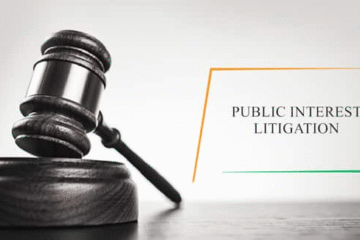
This article is written by Shruti Jain, Teerthanker Mahaveer University, an intern under Legal Vidhiya
ABSTRACT
Election expenditure limits are a vital part of a democratic system, as they promote fairness among candidates and prevent excessive financial influence in elections. This article provides a critical legal and constitutional examination of these limits in India, covering their development, judicial interpretations, legal structure, and international comparisons. The article also investigates the conflict between expenditure limits and the right to free speech and expression, as guaranteed by Article 19 of the Indian Constitution. It concludes with recommendations for a more transparent and just electoral process.
KEYWORDS
Election expenditure, Constitutional law, Free speech, Representation of the People Act, Election Commission of India, Electoral reforms, Political funding transparency,
INTRODUCTION
Election expenditure limits are a crucial element of democratic governance, intended to create an equitable environment for candidates and prevent the excessive impact of wealth on elections. In India, the regulation of these expenses is mainly dictated by the Representation of the People Act, 1951, along with guidelines from the Election Commission of India and constitutional mandates. These expenditure limits aim to maintain free and fair elections in India. This article offers a thorough legal and constitutional examination of election expenditure limits in India, covering their statutory structure, judicial interpretations, enforcement issues, and international comparisons. It also suggests ways to reinforce the regulatory system to improve electoral integrity.
STATUTORY FRAMEWORK GOVERNING ELECTION EXPENDITURE LIMITS
The regulation of election expenditure in India is primarily governed by the Representation of the People Act, 1951. This Act consolidates and amends laws related to the conduct of elections for Parliament and State Legislatures, and it also outlines the qualifications and disqualifications for membership in these bodies.
A. Representation of the People Act, 1951
Every candidate at an election, either personally or through their election agent, must maintain a separate and accurate record of all election-related expenditures. This includes expenses incurred or authorized by the candidate or their agent, starting from the nomination date and ending on the date the election result is declared, inclusive as per Section 77 of the Act[1]. Failure to comply with this requirement can lead to disqualification under Section 10A of the Act[2].
Each candidate contesting an election must submit an account of their election expenses to the relevant authority within thirty days of the declaration of the winning candidate as required by Section 78 of the Act. If multiple candidates are declared winners on different dates, the 30-day period will be calculated from the later of those dates. This account must accurately reflect the records maintained by the candidate or their election agent as per Section 77[3]
The Election Commission of India routinely adjusts these limits to reflect inflation and the evolving dynamics of campaigns. For instance, in the 2019 Lok Sabha elections, the expenditure cap was set at ₹70 lakh for metropolitan areas and ₹54 lakh for other regions. For Assembly elections, the limit varied between ₹28 lakh and ₹40 lakh, depending on the state[4].
B. Election Commission of India’s Guidelines
The Election Commission of India provides comprehensive guidelines that delineate what expenses are allowed and disallowed. These cover include expenses for publicity, rallies, transportation, campaign materials, and worker payments. Additionally, the guidelines prohibit using government resources for campaigning and regulate the involvement of third parties and political entities in campaign financing[5].
To ensure compliance during elections, the Election Commission of India has implemented measures such as flying squads, expenditure observers, and video surveillance teams[6].
CONSTITUTIONAL BASIS FOR ELECTION EXPENDITURE LIMITS
The constitutional basis for regulating election expenditures lies in several provisions of the Indian Constitution, particularly aiming to balance free speech with electoral fairness.
A. Equality Before Law
Expenditure limits support the principle of equality before law under Article 14. Excessive spending can unfairly advantage wealthy candidates, undermining the concept of electoral equality. The Supreme Court has affirmed that these limits are essential to prevent the distortion of democracy by financial power, ensuring elections are based on merit rather than financial strength[7].
B. Freedom of Speech and Expression
Article 19(1)(a) guarantees the right to freedom of speech and expression. While political expression is protected, it is subject to reasonable restrictions under Article 19(2), in the interest of public order, morality, and integrity of elections. Expenditure limits are thus a reasonable restriction to prevent the misuse of free speech through disproportionate financial influence[8].
C. Superintendence, Direction, and Control of Elections
Under Article 324, The Election Commission of India is vested with the authority to oversee, direct, and control elections. This constitutional provision enables the ECI to manage election spending and ensure adherence to spending limits[9].
. JUDICIAL INTERPRETATIONS AND LANDMARK JUDGEMENTS
The Supreme Court of India has been essential in interpreting the constitutional legitimacy of election spending limits and influencing the regulatory structure.
It states that transparency in elections requires disclosing both the sources and uses of funds in an audited statement. They suggest candidates list income sources for verification by tax authorities and recommend statutory audits for political parties and candidates, monitored through income tax returns [10].
Similarly, the Delhi High Court, emphasizes that political parties, integral to democracy, handle substantial public funds, often unaccounted for, thus proper auditing is crucial for fair elections. The court urges the executive and legislature to prioritize the 255th LCI report’s recommendations to prevent financial influence from distorting elections, promoting transparency and accountability in political party operations, ultimately strengthening democracy .[11]
The Supreme Court noted governmental inaction in enforcing Income Tax Act provisions for political parties’ income returns. They emphasized that Section 13-A of the Income Tax Act, along with Section 293-A of the Companies Act, aims for transparency in political parties’ fundraising and spending. Mandatory audited accounts for political parties must be strictly enforced by income tax authorities.[12]
DIFFICULTIES IN ENFORCING ELECTION EXPENDITURE LIMITS
Despite a strong legal structure, the enforcement of election expenditure limits faces multiple difficulties.
A. Underreporting and Hiding of Expenses
Candidates often underreport expenses, using third parties, political parties, and independent groups to fund campaigns beyond what is allowed. This undermines the point of expenditure limits[13].
B. Role of Third Parties and Political Parties
While the Representation of the People Act focuses on candidate expenditure, but political parties spending on behalf of candidates is not as closely monitored. This allows for excessive spending through indirect methods.
C. Monitoring Mechanisms and Limitations
Although the Election Commission of India uses flying squads, expenditure observers, and video surveillance. However, these actions have limited reach, especially in rural areas.
.RECOMMENDATION FOR REFORM
To improve the efficacy of election expenditure regulation, the following reforms are advised. The subsequent recommendations seek to rectify legal, administrative, and technological shortcomings in the existing system:
A .Strengthening the Election Commission of India
The Election Commission of India should be granted legal authority to more efficiently enforce spending limits. This encompasses the power to perform immediate audits, launch independent investigations, and implement immediate penalties or disqualifications in confirmed instances of significant overspending. The existing reliance on post-election petitions under the RPA diminishes deterrence.
B. Establishing Partial State Funding of Elections
To curb the impact of private and unclear donations, the implementation of partial public funding contingent on adherence to expenditure limits and complete disclosure should be considered[14]. This approach, which has been successfully implemented in countries such as Germany and Canada, can contribute to creating a more equitable environment.
C. Mandating Real-Time Financial Disclosure
Candidates and parties should be mandated to promptly disclose all significant expenses and donations on a central, publicly accessible portal managed by the Election Commission of India[15]. This would enhance transparency and enable timely public scrutiny and media coverage.
D. Creating an Independent Election Expenditure Monitoring Authority
An independent body, overseen by parliament, could be established to audit, investigate, and report on campaign finances, separate from the ECI’s administrative duties. This would bolster institutional independence and public confidence
E. Regulating Digital Campaigning and Influencer Advertising
The law should be modernized to explicitly regulate spending on digital advertisements, social media influencers, and data-driven political campaigning. This includes setting financial limits, disclosure guidelines, and content archiving requirements for digital platforms.
F. Capping Party-Level and Third-Party Expenditure
Political parties and third-party entities, such as NGOs or interest groups, should be subject to expenditure limits and accountability standards during campaign periods to prevent circumvention through indirect spending.
CONCLUSION
Election expenditure limits play a crucial role in maintaining the integrity and fairness of India’s electoral process. The existing constitutional and statutory framework offers a strong basis for regulating campaign finance, although enforcement challenges remain. Judicial decisions have affirmed the legitimacy of expenditure limits as reasonable constraints on freedom of speech. To effectively control the impact of money, reforms in transparency, monitoring, and penalties are essential. Enhancing these mechanisms will support democratic principles and ensure that elections are fought on the strength of ideas and merit, rather than financial power.
REFERENCES
- V.S. Rama Devi & S.K. Mendiratta, How India Votes: Election Laws, Practice and Procedure (3d ed. 2017).
- M.P. Jain, Indian Constitutional Law (8th ed. 2018).
- D.D. Basu, Commentary on the Constitution of India vol. 1 (9th ed. 2012).
- Milan Vaishnav, When Crime Pays: Money and Muscle in Indian Politics (HarperCollins 2017).
- B.L. Fadia, Indian Government and Politics (Sahitya Bhawan 2020).
- N.S. Gehlot, Elections and Electoral Reforms in India (Deep & Deep Publications 2005).
[1] Representation of the People Act, No. 43 of 1951, , § 77
[2] Ibid, § 10A
[3] Ibid, , § 78
[4] ECI, https://old.eci.gov.in ,a candidate can spend – ECI – Election Commission
[5] The Carter Center, https://eos.cartercenter.org , Financing political parties and election campaigns – guidelines
[6] https://hindi.eci.gov.in ,ELECTION COMMISSION OF INDIA
[7] Constitution of India , Art.14
[8] Ibid, Art.19(1)(a) & 19(2)
[9] Ibid , Art. 324
[10] People’s Union for Civil Liberties and Anr. V. Union of India and Anr. [(2003) 4 SCC 399]
[11] Commissioner of Income Tax Delhi v. Indian National Congress ITA 145 and 180/2001
[12] Common Cause v Union of India & Others (AIR 1996 SC 3081)
[13] Paras Diwan, Election Law and Practice 120 (3 ed. 2019) (LexisNexis Butterworths India)
[14] University of Pennsylvania, https://casi.sas.upenn.edu ,Reforming India’s Party Financing and Election Expenditure Law
Disclaimer: The materials provided herein are intended solely for informational purposes. Accessing or using the site or the materials does not establish an attorney-client relationship. The information presented on this site is not to be construed as legal or professional advice, and it should not be relied upon for such purposes or used as a substitute for advice from a licensed attorney in your state. Additionally, the viewpoint presented by the author is personal.




0 Comments